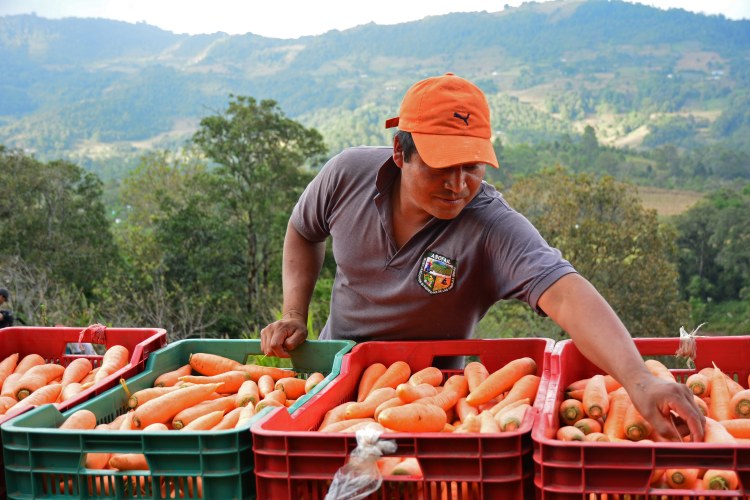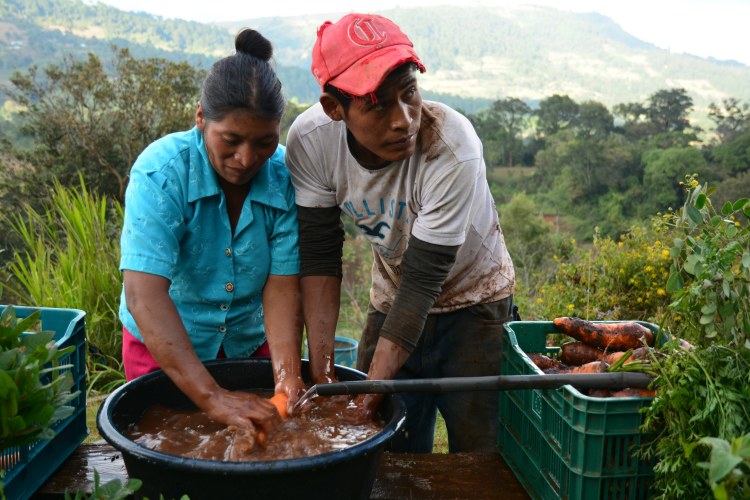Fruits and Vegetables in Honduras
Fruits and Vegetables in Honduras
The food retail industry in Central America is dominated by a small number of supermarkets. Their involvement is therefore key to making the vegetable market more inclusive and sustainable. A fair relationship between farmers and companies, as well as better prices, would ensure the continuity of the farms, securing the food chain and giving the producers enough additional revenue to invest in environmentally-friendly technologies. We believe these steps are necessary to fight climate change and feed the growing urban population.
The Honduran vegetable market is still mainly informal. However, in recent years, the formal market has expanded and become more significant. It now represents 20% of the market share. In the future, supermarkets such as La Colonia, Walmart and La Antorcha will continue to increase their influence in the region. They are such huge market players that farmers selling to them individually have no leverage. To be able to negotiate with them on equal terms, 8 farmers’ organizations (HORTISA, PROVIASA, La Meseta, Tropical Yojoa, ECARAI, ISEN, Vegetales Lencas and VERYFRUP) united in 2012 to create El Consorcio. Together, they represent a total of 437 farmers (339 men and 98 women). The strength of the new company makes it easier to negotiate and access credit. Moreover, by coordinating their production, the farmers avoid competing with one another and ensure a stable year-round production of all of the crops.
The initiative has been a success so far. By 2013, El Consorcio was selling 30 different crops (vegetables, fruits and herbs) with a production of nearly 10,000kg per month. 70% is sold to La Colonia, and the remaining 30% is divided between Walmart and La Antorcha.
The Consorcio wants to consolidate this chain and expand it by selling processed products as well. To do so, it has created its own label: El Agricultor. The processed products will be sold by La Colonia but promoted under the new brand in order to increase its visibility.
Over half of the families’ revenue comes from their vegetables. Farmers own on average 0.7 hectares of land, but only use half of this amount. About 27% of fields have some form of irrigation system and 15% are protected by small greenhouses. The fields equipped with greenhouses have three production cycles annually as they are not affected by climate hazards such droughts, torrential rains or frost.
Challenges
- Farmers do not have access to credit so they can not invest in irrigation systems or greenhouses, nor can they buy the right inputs.
- Most farmers do not use Good Agricultural Practices which affects their productivity. Having GAP certificates will be essential in future in order to trade with the supermarkets.
- There are very few irrigation and protective systems. As a result there is a high incidence of diseases and the plantations are very vulnerable to climate hazards.
- Only 4 of the 8 companies forming El Consorcio have warehouses, but even these need better equipment.
- There are no refrigerated vehicles for transporting the vegetables, which breaks the cold chain and affects the quality.
- The incursions of intermediaries, who go directly to the communities to buy products without checking them against any quality standards, can undermine the commitment of some farmers to the chain, even when the prices they receive are lower than those paid by La Colonia.
- El Consorcio’s business activity is too limited to become sustainable in the long term, so it is necessary to diversify.
- El Consorcio does not have a solid administrative culture, which affects their position in the market.
- Women and young farmers are under-represented in the chain.
Our Strategies
- To improve productivity and obtain the GAP certificates that are necessary for the formal market, we organise training for agricultural engineers who can assist the farmers. The objective is to ensure farmers can attain the “Honduras Premium” certificate.
- We help to find credit or grants to fund the installation of irrigation and protection systems.
- We help El Consorcio to explain to farmers the long-term benefits of the chain over the short-term benefits of selling to middlemen.
- We promote the recruitment of women in the warehouses, and make sure they get management positions.
- We promote the new “El Agricultor” brand for processed vegetables and fruits. La Colonia has offered marketing assistance.
- We create and maintain communication platforms so the different members of El Consorcio can negotiate among one another and with other key stakeholders such as La Colonia, banks etc.
- We create new warehouses and restore the existing ones so they have the best technology and obtain “Honduras Premium” certification for their Good Management Practices.
- We create a stable relationship with La Colonia and the other buyers based on formal contracts.
- To strengthen the cooperative, we promote leadership and management courses.
- We aim for an increase in membership (preferably young producers) and the range of crops.

Achieved results
- A verbal but stable contract with La Colonia where the supermarket specifies its demand in advance so El Consorcio can plan the production.
- A nearly 100% increase in production.
- Negotiations with Walmart and La Antorcha to sign formal contracts.
- 105.3 hectares with irrigation systems
- 26.69 hectares with Greenhouses
- 103 women are participating in the chain
- 6 products with value added

What do we expect in the long-term?
- The Honduran vegetable market will become more sustainable as other companies follow the example of La Colonia and Walmart.
- El Agricultor will become a model for other farmers’ organisations who create their own label.
- El Consorcio will have a diversified economy that protects its future.